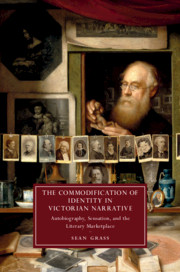 The Commodification of Identity in Victorian Narrative
The Commodification of Identity in Victorian Narrative Book contents
- The Commodification of Identity in Victorian Narrative
- Cambridge Studies in Nineteenth-century Literature and Culture
- The Commodification of Identity in Victorian Narrative
- Copyright page
- Dedication
- Contents
- Figures
- Acknowledgments
- Introduction Life Upon the Exchange: Commodifying the Victorian Subject
- Chapter 1 “A Vile Symptom”: Autobiography and the Commodification of Identity
- Chapter 2 “Portable Property”: Commodity and Identity in Great Expectations
- Chapter 3 Lady Audley’s Portrait: Textuality, Gender, and Power
- Chapter 4 Amnesia, Madness, and Financial Fraud: Ontologies of Loss in Silas Marner and Hard Cash
- Chapter 5 “What Money Can Make of Life”: Willing Subjects and Commodity Culture in Our Mutual Friend
- Chapter 6 The Moonstone, Sacred Identity, and the Material Self
- Conclusion Money Made of Life: The Tichborne Claimant
- Appendix
- Notes
- Works Cited
- Index
- Cambridge Studies in Nineteenth-Century Literature and Culture
Chapter 2 - “Portable Property”: Commodity and Identity in Great Expectations
Published online by Cambridge University Press: 24 October 2019
- The Commodification of Identity in Victorian Narrative
- Cambridge Studies in Nineteenth-century Literature and Culture
- The Commodification of Identity in Victorian Narrative
- Copyright page
- Dedication
- Contents
- Figures
- Acknowledgments
- Introduction Life Upon the Exchange: Commodifying the Victorian Subject
- Chapter 1 “A Vile Symptom”: Autobiography and the Commodification of Identity
- Chapter 2 “Portable Property”: Commodity and Identity in Great Expectations
- Chapter 3 Lady Audley’s Portrait: Textuality, Gender, and Power
- Chapter 4 Amnesia, Madness, and Financial Fraud: Ontologies of Loss in Silas Marner and Hard Cash
- Chapter 5 “What Money Can Make of Life”: Willing Subjects and Commodity Culture in Our Mutual Friend
- Chapter 6 The Moonstone, Sacred Identity, and the Material Self
- Conclusion Money Made of Life: The Tichborne Claimant
- Appendix
- Notes
- Works Cited
- Index
- Cambridge Studies in Nineteenth-Century Literature and Culture
Summary
During Pip’s first week in London at the dawn of his expectations, Mr. Wemmick gives him a bit of advice that could serve neatly as an epigraph for the novel. “It don’t signify to you with your brilliant look-out,” he says, “but as to myself, my guiding-star always is, ‘Get hold of portable property.’” The remark comes as they stand in Jaggers’s office and Wemmick, like the curator of a seedy menagerie, shows Pip the bizarre relics left by clients who have gone to the gallows: Wemmick’s brooch and mourning-rings, the seals hanging from his watch-chain, and “the two odious casts with the twitchy leer upon them” that Wemmick apostrophizes during the scene (156).
- Type
- Chapter
- Information
- The Commodification of Identity in Victorian NarrativeAutobiography, Sensation, and the Literary Marketplace, pp. 78 - 104Publisher: Cambridge University PressPrint publication year: 2019
